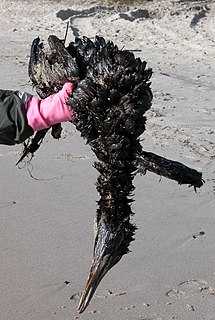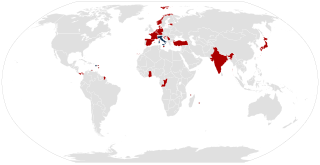Related Research Articles

The International Maritime Organization is a specialised agency of the United Nations responsible for regulating shipping. The IMO was established following agreement at a UN conference held in Geneva in 1948 and the IMO came into existence ten years later, meeting for the first time in 1959. Headquartered in London, United Kingdom, the IMO currently has 174 member states and three associate members.
Admiralty law or maritime law is a body of law that governs nautical issues and private maritime disputes. Admiralty law consists of both domestic law on maritime activities, and private international law governing the relationships between private parties operating or using ocean-going ships. While each legal jurisdiction usually has its own legislation governing maritime matters, the international nature of the topic and the need for uniformity has, since 1900, led to considerable international maritime law developments, including numerous multilateral treaties.

The International Convention for the Prevention of Pollution from Ships, 1973 as modified by the Protocol of 1978 is one of the most important international marine environmental conventions. It was developed by the International Maritime Organization with an objective to minimize pollution of the oceans and seas, including dumping, oil and air pollution.

Flag of convenience (FOC) is a business practice whereby a ship's owners register a merchant ship in a ship register of a country other than that of the ship's owners, and the ship flies the civil ensign of that country, called the flag state. The term is often used pejoratively, and although common, the practice is sometimes regarded as contentious. Each merchant ship is required by international law to be registered in a registry created by a country, and a ship is subject to the laws of that country, which are used also if the ship is involved in a case under admiralty law. A ship's owners may elect to register a ship in a foreign country which enables it to avoid the regulations of the owners' country which may, for example, have stricter safety standards. They may also select a jurisdiction to reduce operating costs, avoiding higher taxes in the owners' country and bypassing laws that protect the wages and working conditions of mariners. The term "flag of convenience" has been used since the 1950s. A registry which does not have a nationality or residency requirement for ship registration is often described as an open registry. Panama, for example, offers the advantages of easier registration and the ability to employ cheaper foreign labour. Furthermore, the foreign owners pay no income taxes.

The Oil Pollution Act of 1990 (OPA) was passed by the 101st United States Congress and signed by President George H. W. Bush. It works to avoid oil spills from vessels and facilities by enforcing removal of spilled oil and assigning liability for the cost of cleanup and damage; requires specific operating procedures; defines responsible parties and financial liability; implements processes for measuring damages; specifies damages for which violators are liable; and establishes a fund for damages, cleanup, and removal costs. This statute has resulted in instrumental changes in the oil production, transportation, and distribution industries.
The International Convention for the Safety of Life at Sea (SOLAS) is an international maritime treaty that sets minimum safety standards in the construction, equipment and operation of merchant ships. The convention requires signatory flag states to ensure that ships flagged by them comply with at least these standards.
Protection and indemnity insurance, more commonly known as P&I insurance, is a form of mutual maritime insurance provided by a P&I club. Whereas a marine insurance company provides "hull and machinery" cover for shipowners, and cargo cover for cargo owners, a P&I club provides cover for open-ended risks that traditional insurers are reluctant to insure. Typical P&I cover includes: a carrier's third-party risks for damage caused to cargo during carriage; war risks; and risks of environmental damage such as oil spills and pollution. In the UK, both traditional underwriters and P&I clubs are subject to the Marine Insurance Act 1906.

The American Bureau of Shipping (ABS) is an American maritime classification society established in 1862. Its stated mission to promote the security of life, property and the natural environment, primarily through the development and verification of standards for the design, construction and operational maintenance of marine and offshore assets.

The Convention on International Liability for Damage Caused by Space Objects, also known as the Space Liability Convention, is a treaty from 1972 that expands on the liability rules created in the Outer Space Treaty of 1967. In 1978, the crash of the nuclear-powered Soviet satellite Kosmos 954 in Canadian territory led to the only claim filed under the convention.

The Prestigeoil spill occurred off the coast of Galicia, Spain, caused by the sinking of the 26 year old structurally deficient oil tanker MV Prestige in November 2002, carrying 77,000 tonnes of heavy fuel oil. During a storm, it burst a tank on November 13, and French, Spanish, and Portuguese governments refused to allow the ship to dock. The vessel subsequently sank on November 19, 2002, about 210 kilometres (130 mi) from the coast of Galicia. It is estimated that it spilled 60,000 tonnes or a volume of 67,000 m3 (17.8 million US gal) of heavy fuel oil. The spill polluted thousands of kilometers of coastline and more than one thousand beaches on the Spanish, French and Portuguese coast, as well as causing great harm to the local fishing industry. The spill is the largest environmental disaster in the history of both Spain and Portugal. The amount of oil spilled was more than the Exxon Valdez incident and the toxicity considered higher, because of the higher water temperatures.

The MT Hebei Spirit oil spill was a major oil spill in South Korea that began on the morning of 7 December 2007 local time, with ongoing environmental and economic effects. Government officials called it South Korea's worst oil spill ever, surpassing a spill that took place in 1995. This oil spill was about one-third of the size of the Exxon Valdez oil spill.
Admiralty law in the United States is a matter of federal law.
The Erika legislative packages of the European Union are maritime laws intended to improve safety in the shipping industry and thereby reduce environmental damage to the oceans.
The International Convention on Civil Liability for Oil Pollution Damage, 1969, renewed in 1992 and often referred to as the CLC Convention, is an international maritime treaty admistered by the International Maritime Organization that was adopted to ensure that adequate compensation would be available where oil pollution damage was caused by maritime casualties involving oil tankers.

The Hong Kong International Convention for the safe and environmentally sound recycling of ships, or Hong Kong Convention is a mulitateral convention adopted in 2009, which has not entered into force. The conference that created the convention was attended by 63 countries, and overseen by the International Maritime Organization (IMO).

The Maritime Labour Convention (MLC) is an International Labour Organization convention, number 186, established in 2006 as the fourth pillar of international maritime law and embodies "all up-to-date standards of existing international maritime labour Conventions and Recommendations, as well as the fundamental principles to be found in other international labour Conventions". The other "pillars are the SOLAS, STCW and MARPOL. The treaties applies to all ships entering the harbours of parties to the treaty, as well as to all ships flying the flag of state party.
International Convention Relating to Intervention on the High Seas in Cases of Oil Pollution Casualties 1969 is an international maritime convention affirming the right of a coastal State to "take such measures on the high seas as may be necessary to prevent, mitigate or eliminate grave and imminent danger to their coastline or related interests from pollution or threat of pollution of the sea by oil, following upon a maritime casualty or acts related to such a casualty".
The International Convention on Salvage is a treaty that was concluded in London on 28 April 1989 that replaced the Brussels Convention on Assistance and Salvage at Sea as the principal multilateral document governing marine salvage.

The HNS Convention is an international convention created in 1996 to compensate for damages caused by spillage of hazardous and noxious substances during maritime transportation. The convention is officially known as the International Convention on Liability and Compensation for Damage in Connection with the Carriage of Hazardous and Noxious Substances by Sea, 1996. The convention has not entered into force due to signatory states not meeting the ratification requirements. Canada, France, Germany, Greece, the Netherlands, Norway, and Turkey signed the 2010 protocol to the convention.
The International Convention on Civil Liability for Bunker Oil Pollution Damage (BUNKER) is an International treaty listed and administered by the International Maritime Organization, signed in London on 23 March 2001 and in force generally on 21 November 2008. The purpose is to adopt uniform international rules and procedures for determining questions of liability and providing adequate compensation.
References
- ↑ "Archived copy" (PDF). Archived from the original (PDF) on 28 May 2020. Retrieved 10 February 2019.
{{cite web}}: CS1 maint: archived copy as title (link) - 1 2 3 "International Convention on the Establishment of an International Fund for Compensation for Oil Pollution Damage (FUND), 1971". International Maritime Organization. Archived from the original on 7 July 2009. Retrieved 2 July 2010.
- ↑ "Archived copy" (PDF). Archived from the original (PDF) on 27 August 2013. Retrieved 27 August 2013.
{{cite web}}: CS1 maint: archived copy as title (link) - ↑ MARISEC (2009). Shipping Industry Flag State Performance Table (PDF). London: Maritime International Secretariat Services. pp. 1–2. Retrieved 12 June 2010.[ permanent dead link ]
- ↑ http://www.conflictrecovery.org/bin/Bogumil_Terminski-Oil-Induced_Displacement_and_Resettlement_Social_Problem%5B%5D